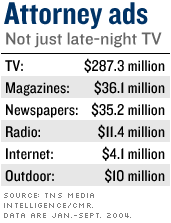NEW YORK (CNN/Money) -
Vioxx users have another scourge to worry about now: hucksters making false promises on the Internet about the millions of dollars they can get from suing Merck & Co., the drug's maker.
In one recent instance, a Web site urges anyone who took Vioxx before Merck pulled it off the market in September to "get your millions" and "benefit from this Once-in-a-Lifetime Opportunity to become a millionaire."
The site, which legal experts labeled a clear case of illegal advertising, caught the attention of at least one powerful lawmaker. Sen. Orrin Hatch last month denounced the "feeding frenzy" created by lawyers who he said are telling Vioxx patients that they have a "slam dunk" case against Merck (Research).
It is legal for lawyers to advertise, and in fact the profession as a whole spent $384 million doing just that in the first nine months of this year, according to research firm TNS Media Intelligence/CMR.
But misleading ads are a clear no-no and the country's top trial lawyer group, the Association of Trial Lawyers of America, has since denounced the site -- www.vioxx.x.yi.org -- as a sham run out of Canada.
But the ruckus over the site comes at an inauspicious time for trial lawyers.
Next year Hatch and others in the Republican-controlled Congress are likely to push for broad litigation reform -- an issue that President Bush has labeled a top priority. Some states, which regulate lawyers, are considering whether to tighten rules meant to protect consumers from ambulance-chasing attorneys.
The reason: the Internet has enabled legitimate lawyers and scammers alike to reach more people than ever before.
Virtual ambulance-chasers?
William Hornsby, an attorney for the American Bar Association who has tracked how lawyers find clients on the Web, said he's never seen anything like the search for Vioxx patients willing to sue Merck.
| More on Merck & drug safety
|

|
|
|
|
Until now, a highly visible invasion of lawyers looking for prospective clients would happen only when there was a large-scale disaster, said Hornsby, citing the 1980s gas leak in Bhopal, India, which sent lawyers flying to India in their eagerness to sue Union Carbide, owner of the pesticide plant that killed or injured thousands.
"This [the Vioxx crush] is comparable to a mass disaster," said Hornsby.
The Vioxx recall, the largest since the late 1990s withdrawal of Fen-Phen, the diet drug combo, has already spawned more than 300 lawsuits against Merck (Research) and sent its stock tumbling. J. Michael Papantonio, a Florida lawyer who says he represents 1,500 Vioxx users who have not yet sued, estimates Merck could face as many as 40,000 lawsuits.

Lawyers have used pop-up ads, spam, customized Web sites and paid ad searches to find Vioxx users. According to Fathom Online, a San Francisco-based search engine marketing firm, law firms paid up to $38 Tuesday each time an Internet user searched for "Vioxx attorney" and clicked on the accompanying ad.
Compare that to the average price of a keyword: under $2.
So Vioxx lawyers are being aggressive, but does that mean they're crossing the line?
Tort reform advocates think so.
"You can't tell me that some of these lawyers aren't motivated purely by greed," said Gretchen Schaefer, a spokeswoman for the American Tort Reform Association. She claims lawyers are promising huge rewards to Vioxx users, even those who aren't injured, so they can file more lawsuits.
"The bigger the class [of individuals suing], the bigger the award, the bigger the cut that the lawyers get," said Schaefer.
Trial lawyers counter that advertising on the Web -- which accounted for just $4.1 million of total legal ad spending in the first nine months of the year, according to TNS -- helps them offer a necessary public service. Through the Internet they can reach out to victims who otherwise would not know that they have a claim.
"There are abuses of advertising, no question about it," said Kenneth Suggs, president-elect of the Association of Trial Lawyers of America. "There are people who are making outrageous promises. But as distasteful as some of it is, the public does have the right to know about legal services and the availability of legal services."
Courts long ago established that lawyers have the right to advertise. But because lawyers are regulated by states and not the federal government, the laws governing how they can advertise or solicit clients is all over the map. Few states have laws on the books that directly address advertising on the Internet, said Hornsby of the ABA.
Some, like South Carolina, are considering tightening lawyer advertising rules to address complaints against virtual ambulance chasers. Others, like Hawaii, have banned lawyers from contacting prospective clients by e-mail, according to Hornsby.
Another problem: states have not been aggressive enforcers of advertising rules and rarely punish lawyers when they do act.
While tort reform proponents and trial lawyers alike agree some lawyers are looking to swindle consumers on the Web, they agree that not much can be done to stop it.
"The problem is controlling it," said Suggs. "Even if you banned lawyer advertising outright, that wouldn't stop hackers from setting up bogus Web sites and trying to steal money from people."

|

